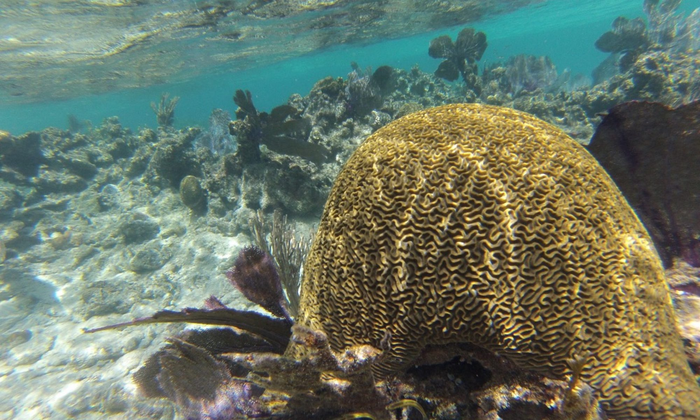A new study examines 150 years of sea-surface temperature in the Greater Caribbean region, pinpointing major warming trends that have harmed coral reef ecosystems. On March 9th, 2022, Colleen Bove and colleagues from the University of North Carolina at Chapel Hill published their findings in the open-access journal PLOS Climate.
 Coral colony on Caribbean reef. Image Credit: Colleen B. Bove, CC-BY 4.0.
Coral colony on Caribbean reef. Image Credit: Colleen B. Bove, CC-BY 4.0.
Climate change produced by human activity not only heats the atmosphere but also heats the world’s oceans, thereby affecting marine ecosystems. Previous studies have reported substantial warming-induced shifts to coral reef ecosystems around the world — particularly in the Caribbean — finding effects like mass coral mortality by coral bleaching and the extinction of reef-dependent fish.
Bove and colleagues have revised their analysis of sea-surface temperature trends for Caribbean coral reefs, based on previous studies. They started by compiling a record of 5,326 Caribbean coral reefs divided into eight sub-regions. They next assessed the history of warming from 1871 to 2020 using three open-access databases of satellite and on-location sea-surface temperature readings.
Since 1915, regionwide, the Caribbean coral reefs have been heating, according to the study. Warming began sooner in four of the eight sub-regions, in the second part of the 19th century.
The researchers discovered that Caribbean reefs have heated by 0.5 to 1°C, with distinct sub-regions experiencing differing rates of warming from one another during the last century. According to the research data, if current warming trends persist, these ecosystems will warm by an average of 1.5 °C by the year 2100.
The study also looked at the frequency of marine heatwaves, which are defined as brief episodes of exceptionally high temperatures in the ocean. They discovered that the frequency and duration of these episodes are increasing across the Caribbean, with reefs now seeing an average of five per year, up from one in the 1980s.
The experts suggested immediate reductions in greenhouse gas emissions, as well as actions to tackle local and regional disruptors of coral reef ecosystems, such as fishing and pollution, throughout the Caribbean and beyond, based on their findings and previous studies.
The authors conclude, “Our study indicates that coral reefs have been warming for at least a century and many reefs across the Caribbean have already warmed by a degree Celsius. This explains why we have seen such devastating declines in the health of this invaluable ecosystem.”
Journal Reference:
Bove, C. B., et al. (2022) A century of warming on Caribbean reefs. PLOS Climate. doi.org/10.1371/journal.pclm.0000002.